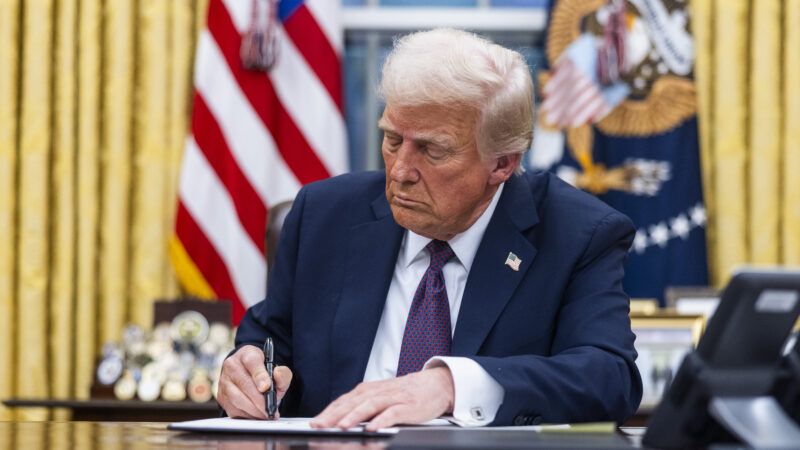Trump Must Choose: Tariffs or Lower Prices
Domestic deregulation will decrease the cost of living. Trade barriers will do the opposite.

President Donald Trump issued a slew of executive orders on Inauguration Day aimed at lowering prices for American consumers, including one directing federal agencies to "deliver emergency price relief" to lower the cost of housing and home appliances and another to "freeze" regulations that increase the cost of doing business.
But Trump's plan to lower prices will be impeded by his support of broad-based tariffs on consumer goods and manufacturing inputs.
The price relief order begins by acknowledging that inflation has increased the cost of living for Americans and the role played by government spending "artificially and unsustainably stimulating demand" under Joe Biden's administration. It also credits Biden-era regulations with imposing "almost $50,000 in costs on the average American household." It grants federal agencies carte blanche to achieve the vague goal of "restor[ing] purchasing power to the American family," so long as they do so in a way that's "consistent with applicable law." (What could possibly go wrong?)
Still, Trump is correct that responsible monetary and fiscal policy is essential to reducing the cost of living. (Though he didn't follow that judgment during his first term as president: He raised the national debt by $8.4 trillion and pressured the Federal Reserve to reduce interest rates to zero.) He is also correct that preventing the passage of regulations that further increase the cost of building homes and doing business and eliminating those rules that have already done so would help the economy grow.
But the president's protectionism will frustrate both of these strategies and increase the cost of living.
After signing his orders, Trump told reporters Monday night that he's thinking of imposing tariffs of up to 25 percent on Mexican and Canadian goods. The Peterson Institute for International Economics recently published a study finding that such tariffs "would slow growth and accelerate inflation in all three countries."
Though the details of Trump's tariffs remain uncertain, he promised in his inauguration speech to establish an "External Revenue Service [ERS] to collect all tariffs, duties, and revenues,…massive amounts of money" from foreign sources. The Secretary of the Treasury was directed to establish the ERS on Monday night by the America First Trade Policy order. Howard Lutnick, Trump's pick to run the Commerce Department, said that "the External Revenue Service will put up tariffs, or walls that protect you." They will do just the opposite.
As Reason's Eric Boehm explains, "The tariffs Trump levied during his first tenure were paid nearly entirely by American consumers and businesses." Trump has to choose: Complement his deregulatory agenda with free trade policies that decrease the price of consumer goods, manufacturing, and production, or hinder them with protectionism that benefits select industries at the expense of the American people. Let's hope the president chooses the former.


Show Comments (89)